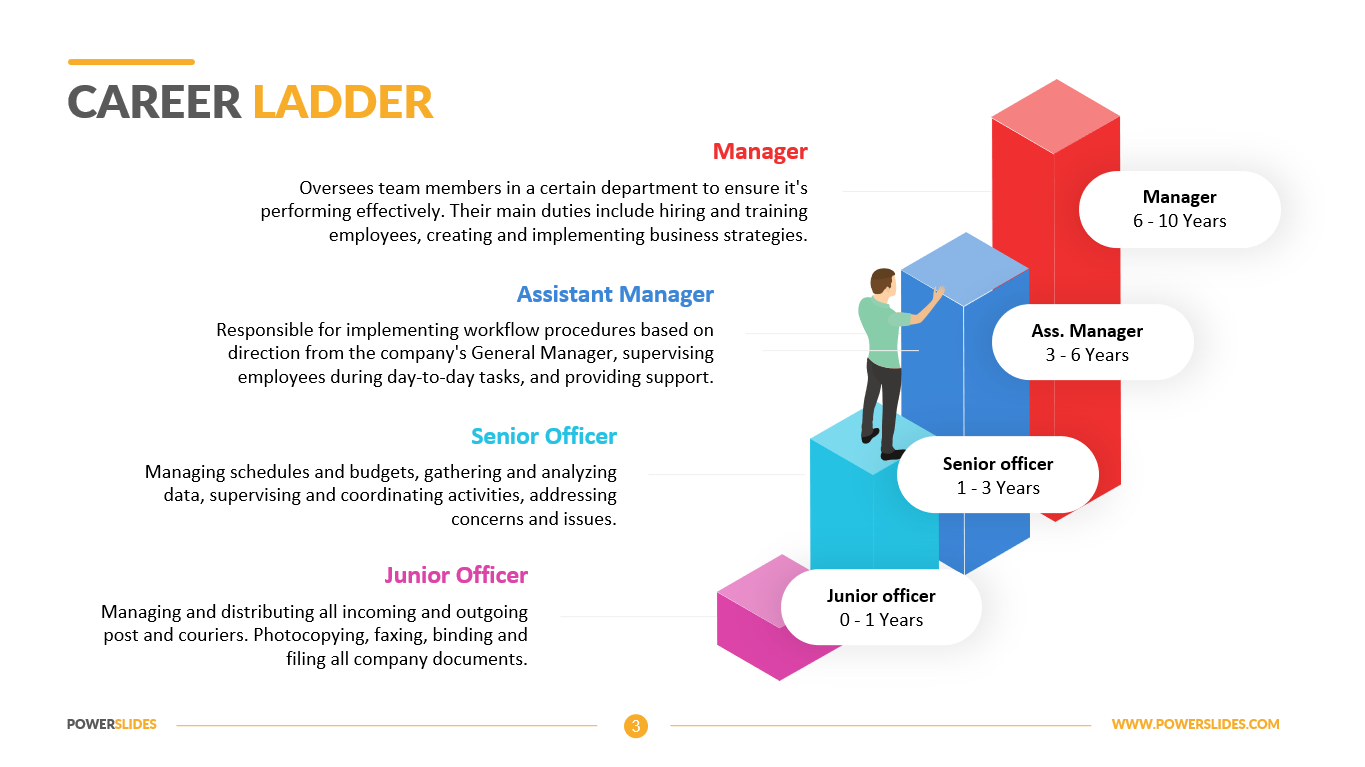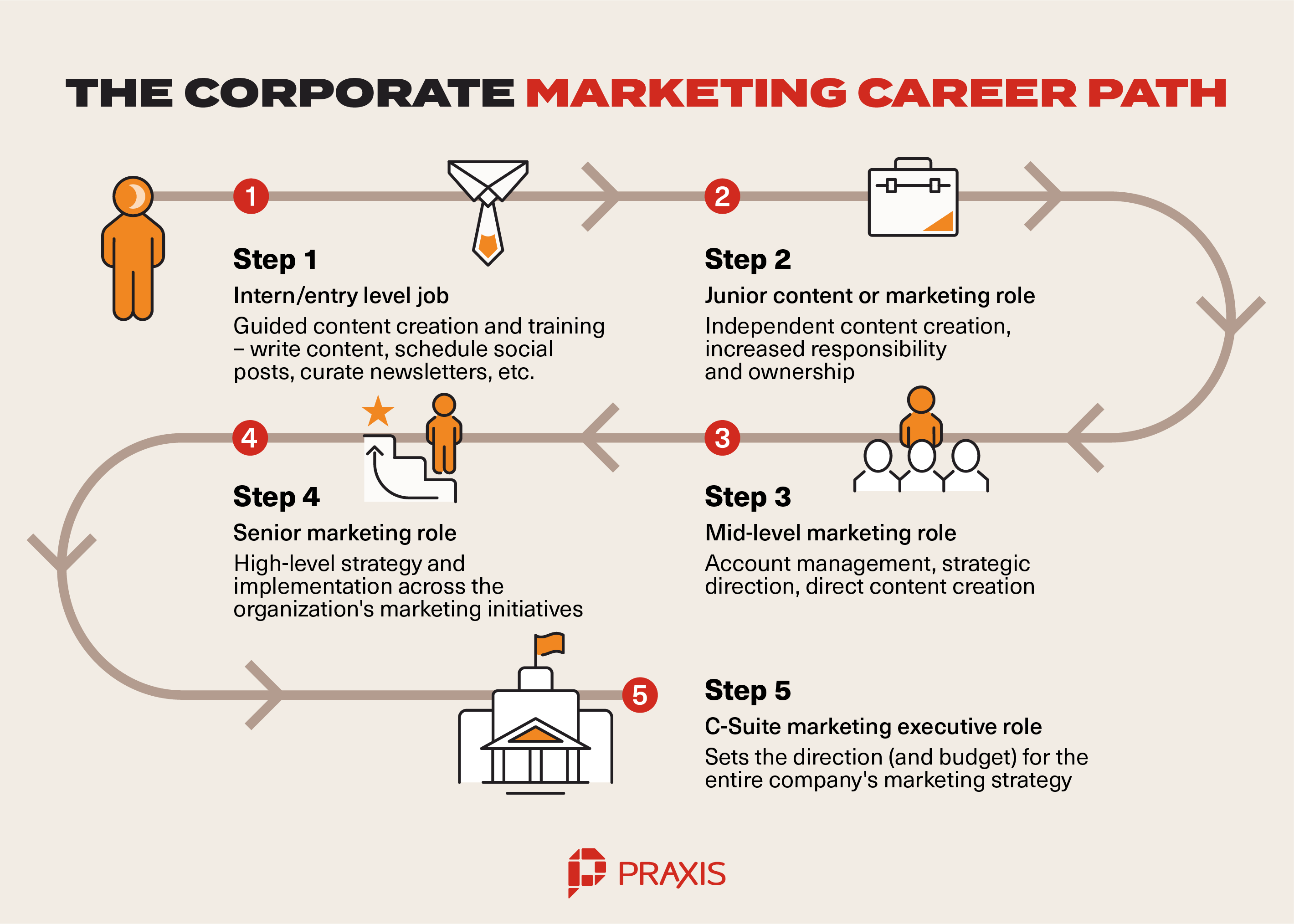Marketing Strategy Ladders to What Job Marketing strategies are essential for business growth. They shape the path to various career opportunities.
Marketing is a dynamic field, offering diverse career paths. From social media managers to market research analysts, the choices are vast. Understanding the steps in marketing can guide you to the right job. Each step in a marketing strategy leads to different roles.
It helps you build skills needed for specific jobs. Knowing what job fits your skills can save time and effort. This guide will explain how marketing strategies connect to various jobs. Discover how your skills align with marketing roles. Get ready to find your perfect fit in the marketing world.

Credit: powerslides.com
Introduction To Marketing Strategy Ladders
Marketing strategy ladders are essential tools for career growth. They help professionals climb the ranks in marketing. Understanding these ladders can lead to better job opportunities.
Defining The Ladder Concept
A marketing strategy ladder is a step-by-step guide. It outlines the skills and roles needed for career advancement. Each rung represents a new level of expertise and responsibility.
For instance, the first rung might be an entry-level role. This could be a marketing assistant or coordinator. The next rung could be a more advanced role, like a marketing manager.
The ladder concept helps visualize career paths. It shows the progression from one role to another. This helps in setting clear career goals.
Importance In Career Growth
Marketing strategy ladders play a crucial role in career growth. They provide a clear roadmap for professionals. This roadmap helps in understanding what is needed to move up.
By following the ladder, you can identify skill gaps. You can then focus on acquiring the necessary skills. This targeted approach ensures steady career progression.
Furthermore, ladders help in setting realistic expectations. They show the typical time and effort required for each level. This helps in planning your career path effectively.
| Ladder Level | Role | Skills Needed |
|---|---|---|
| 1 | Marketing Assistant | Basic marketing knowledge, communication skills |
| 2 | Marketing Coordinator | Project management, analytical skills |
| 3 | Marketing Manager | Leadership, strategic planning |
In summary, marketing strategy ladders are vital for career growth. They offer a clear path and help in skill development. By understanding and using these ladders, you can achieve your career goals.

Credit: discoverpraxis.com
Key Skills For Marketing Professionals
Marketing professionals need a blend of skills to succeed. These skills help them create effective strategies. In this section, we will discuss the essential skills needed for marketing professionals. Each skill plays a unique role in driving successful marketing campaigns.
Analytical Abilities
Analytical abilities are crucial for marketing professionals. They help in understanding data and market trends. Good analytical skills enable marketers to:
- Interpret consumer behavior
- Measure campaign performance
- Identify opportunities for improvement
Using analytics tools, marketers can track key metrics. This helps them make informed decisions. They can adjust strategies based on data insights.
Creative Thinking
Creative thinking is vital in marketing. It allows professionals to come up with innovative ideas. Creativity helps in:
- Designing engaging content
- Developing unique campaigns
- Solving problems in new ways
Marketing is not just about numbers. It’s also about appealing to the audience. Creative thinking helps in crafting compelling messages. These messages resonate with the target audience.
Communication Skills
Communication skills are essential for marketers. They need to convey ideas clearly. Good communication helps in:
- Writing engaging content
- Presenting strategies to stakeholders
- Collaborating with team members
Effective communication ensures that the message is understood. It also builds trust with the audience. Strong communication skills are a must for any marketing professional.
Career Pathways In Marketing
Marketing offers a variety of career pathways. Each pathway provides unique opportunities for growth and development. Understanding these pathways helps you plan your career effectively. Here, we explore the different stages of a marketing career.
Entry-level Positions
Entry-level roles are the starting point in a marketing career. These positions often include:
- Marketing Assistant: Supports marketing managers and executives. Tasks include coordinating marketing activities, managing social media, and assisting with campaigns.
- Content Creator: Produces engaging content. This includes blog posts, videos, and social media updates.
- SEO Specialist: Optimizes website content. Aims to improve search engine rankings and drive organic traffic.
These roles provide a solid foundation. They offer hands-on experience in various marketing functions.
Mid-level Roles
Mid-level positions require more experience. These roles often involve greater responsibilities:
- Marketing Manager: Oversees marketing campaigns. Develops strategies to promote products or services.
- Content Manager: Manages content creation teams. Ensures content aligns with brand guidelines and marketing goals.
- Social Media Manager: Handles a company’s social media presence. Creates and schedules posts, engages with followers, and monitors social media analytics.
Mid-level roles build on entry-level experience. They require strong leadership and strategic thinking skills.
Senior Management
Senior management roles are for experienced professionals. These positions include:
- Marketing Director: Leads the marketing department. Develops long-term marketing strategies and oversees their implementation.
- Chief Marketing Officer (CMO): A top executive role. Responsible for the overall marketing strategy and its alignment with business objectives.
- Brand Manager: Manages the brand’s image and reputation. Develops strategies to enhance brand awareness and loyalty.
Senior management roles demand extensive experience. They focus on high-level strategy and decision-making.
Understanding these career pathways helps you set clear goals. Each stage offers unique challenges and rewards. Start at the entry level, gain experience, and move up the ladder.

Credit: www.bdladder.com
Building A Strong Marketing Portfolio
Building a strong marketing portfolio is crucial for anyone in marketing. A well-crafted portfolio showcases your skills, creativity, and achievements. It tells the story of your journey, skills, and passion. A strong portfolio can open doors to new opportunities. Let’s explore how to build a compelling marketing portfolio.
Showcasing Successful Campaigns
Highlight your best marketing campaigns. Choose campaigns that had a significant impact. Share details of your role and contributions. Use images, videos, and links to your work. Make your portfolio visually appealing. Ensure it is easy to navigate.
- Campaign Title: Name of the campaign
- Objective: The goal of the campaign
- Strategy: Steps taken to achieve the goal
- Outcome: Results of the campaign
Emphasizing Results And Metrics
Metrics are vital in marketing. They show your success in numbers. Include key performance indicators (KPIs) in your portfolio. Metrics like conversion rates, click-through rates, and ROI are important. Present these metrics clearly. Use graphs and charts to make data easy to understand.
| Campaign | Metric | Result |
|---|---|---|
| Social Media Campaign | Engagement Rate | 15% |
| Email Marketing | Open Rate | 25% |
| SEO Strategy | Organic Traffic | 30% increase |
Focus on results that align with your career goals. Highlight achievements that demonstrate your expertise. A strong marketing portfolio is your key to success.
Networking And Professional Development
Investing in networking and professional development is crucial for career growth. Building strong industry connections and continuously learning can open many doors. This section covers leveraging industry connections and continual learning and certifications.
Leveraging Industry Connections
Building a network within your industry is essential. Connect with peers and mentors. Attend industry events and conferences.
Utilize social media platforms like LinkedIn. Join industry groups and participate in discussions. Share insights and updates regularly.
Networking can lead to job opportunities. It can also provide valuable industry insights. Here are some tips for leveraging connections:
- Attend industry events and conferences.
- Join professional groups and associations.
- Connect with peers and mentors on LinkedIn.
- Participate in online forums and discussions.
- Share your knowledge and expertise.
Continual Learning And Certifications
Continual learning is key to staying relevant. The marketing field evolves rapidly. New tools and strategies emerge constantly.
Invest in courses and certifications. Stay updated with the latest trends and technologies. Here are some steps to enhance your professional development:
- Identify skill gaps and areas for improvement.
- Enroll in relevant courses and workshops.
- Earn industry-recognized certifications.
- Subscribe to industry journals and newsletters.
- Follow thought leaders and influencers.
Consider these popular certifications:
| Certification | Provider |
|---|---|
| Google Analytics | |
| HubSpot Content Marketing | HubSpot |
| Facebook Blueprint |
These certifications can enhance your resume. They demonstrate your commitment to continual learning and professional growth.
Frequently Asked Questions
What Is A Marketing Strategy Ladder?
A marketing strategy ladder is a step-by-step plan. It helps you reach business goals.
How Does A Marketing Ladder Work?
It outlines key steps. Each step builds on the previous one to achieve success.
Why Use A Marketing Strategy Ladder?
It organizes efforts. Ensures consistent progress towards marketing objectives.
What Are The Stages Of A Marketing Ladder?
Stages include research, planning, execution, analysis, and refinement. Each stage is crucial.
Can Small Businesses Benefit From A Marketing Ladder?
Yes, it helps small businesses stay focused. Maximizes limited resources effectively.
How To Create A Marketing Strategy Ladder?
Start with research. Define goals, plan actions, execute, analyze results, and refine strategies.
Conclusion
Effective marketing strategy ladders you to the right job. Understanding customer needs is key. Focus on clear goals and targeted efforts. Analyze and adapt your strategies regularly. Stay updated with market trends. Building strong relationships with your audience is crucial.
Consistency in your messaging helps build trust. Keep learning and improving. Your marketing skills will lead you to success.
